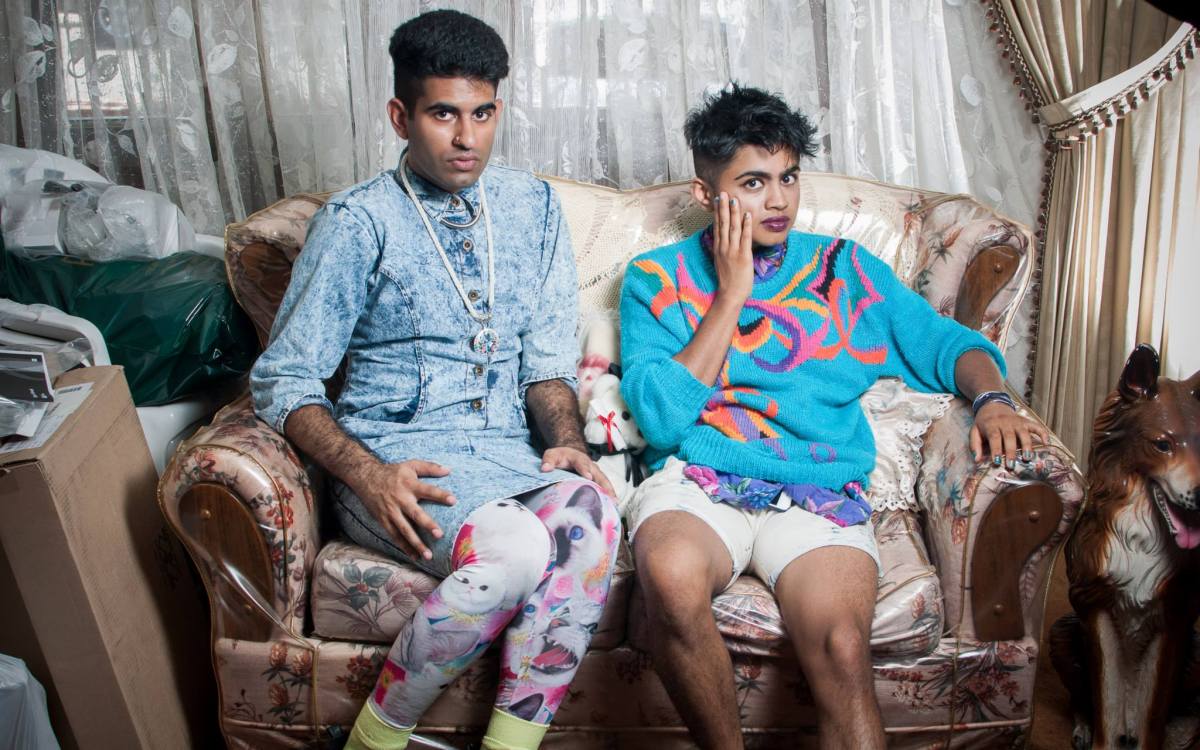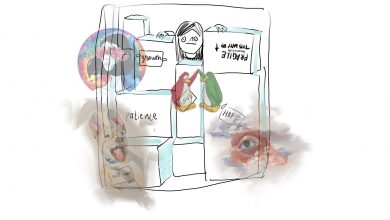Artist Profile: Alok Vaid-Menon

Left to right: Alok Vaid-Menon and Janani Balasubramanian via Wikimedia Commons / CC BY-SA 4.0
Feminist art and activism too often center only the experiences and perspectives of white, cisgender women. Not only does this exclusion harm individuals whose identities do not fall into those neat categories, but it also harms white, cisgender women themselves. It is crucial for us to challenge this exclusivity in feminism by celebrating artists who are not cis white women, like Alok (they/them) Vaid-Menon. Alok, who often goes by simply their first name, is a poet, blogger, performer and community organizer whose work challenges white feminism’s notions about identity and activism. Their work explores their personal identity as a gender non-conforming Indian individual as well as sociopolitical analysis and commentary.
Alok has a vast and deep body of emotional, educational work. On their website, they have almost 200 poems and blog posts with titles ranging from “cis feminism’s double standards” to “The Grief of Having No Language to Express Your Grief.” They have presented their performance art in more than 30 countries, and are featured in the documentary about American trans experiences, The Trans List. They also recently published a book of poetry titled Femme in Public whose central questions are: “What feminine part of yourself did you have to destroy in order to survive in this world? At what point does femininity become synonymous with apology? Who hurt the people who hurt you?”
Through their writing and performance art, they recount raw personal stories, including ones about the daily violence they experience as a gender non-conforming person. Since they don’t try to “pass” as either a man or a woman, people try to violently force them to fit into either category. In their video “The Pain & Empowerment of Choosing Your Own Gender,” they discuss being spat on, called every slur imaginable, and told to leave restrooms.
On top of being gender non-conforming, Alok is Indian, so their work also unpacks how that influences the experiences they have every day. They explain an incident in which a man on the subway was in the middle of calling them “Osama,” but when he looked down and saw Alok was wearing heels, stopped in his tracks because the heels didn’t match the man’s expectations of what a “terrorist” looks like. Listening to Alok’s countless stories about transphobia and racism is incredibly important because it pushes the reader to begin to understand the violence trans people face simply for existing. This violence often goes beyond slurs and being spat on; in 2017, 26 trans people were killed, 24 of whom were trans people of color.
Though their work is often incredibly serious, Alok also celebrates the power of vulnerability, color, and joy in the face of a world full of hatred. Their Instagram features photos of them modeling their eclectic, colorful clothing and makeup captioned with sarcastic, comedic, or uplifting comments like “h8 having to say ‘i am an artist’ bc bitch i am the art !!!” or “the other day this stranger spit on me & told me i was a disgusting. i was like lady c’mon i somehow managed to make a vintage clown suit high fashion, what have YOU accomplished in your life ???” To Alok, their colorful sense of style and kindness is a radical act that they refer to as “radical niceness” which they define as “really recognizing that part of what we’re doing is trying to remember old ways of relating to each other, of learning together, of resisting together outside of what we have been taught.”
At the core of Alok’s work is the message that people ought to be able to self-narrate their bodies and express themselves in any way they choose, regardless of their gender. Alok points out in a recent article from The Guardian that lately, people are becoming increasingly welcoming to trans people––as long as they can pass as cisgender. In their poem “desire is too complex for gender,” Alok expresses their frustrations with the gender binary and how they feel the most themselves when they combine traditionally masculine and feminine traits. In other words, trans women should feel free to embrace their facial hair if they choose to, cis men should feel comfortable expressing emotion; anyone with any gender should express themselves in a way that is not limited by strict categories and binaries.
Many of the hateful messages Alok receives involve people thinking that they are just a man pretending to be a woman. Alok retorts with statements that completely unwravel the logic of this kind of transphobic thinking. In their own words: “[t]he very core of trans-misogyny is that we’re always seen as masquerading as something were not. We are always seen as worthy of our violence. That’s why people don’t stand up for us.” This statement gets at the root of the anxiety that people feel about the trans community in general, particularly toward trans people who were assigned male at birth; people think that they are predatory men who want to trick people into thinking they are women.
In a Facebook post from Darkmatter, the poetry duo Alok was formerly one half of, Alok and their performance partner write “…the narrative is that freaky transgender people (or as they say ‘crossdressers’) will come into your bathrooms and abuse innocent little girls.” Even though this post was literally unpacking how the symbol of the little cis white girl is used against the trans community, people were offended and believed the poets were blaming little girls for the violence against them. This negative reaction demonstrates how the construct of the little girl bolsters American national anxieties and propaganda against trans people.
Even though their writing and performances often focus specifically on being gender non-conforming, they clearly express that their work is about letting everyone self-narrate their bodies. In their blog post “ending the gender binary helps everyone,” they discuss how their mission to end the gender binary is not about making everyone identify as gender non-conforming, but rather about freeing everyone from the restrictions of arbitrarily categorizing traits and clothing items into two “opposite” genders. In other words, they write: “What would it take to get people to realize that trans feminism isn’t just about trans people, but about everyone? A critique of vagina-centered feminism is a critique that expands the horizons of what is possible for all people, of all genders.” Though I am a cis woman, I learned nearly everything I know about gender through reading and watching Alok’s work.
Alok’s work is moving, beautiful, hilarious, eloquent, and most importantly, incredibly eye-opening. Alok themselves is a beacon of compassion and light in these scary, unsettling times. They are radically reshaping how we think about our own identities as well as how we interact with one another, one poem and outfit at a time. Alok’s message about resilience and kindness is exactly what the world needs to hear right now, so we must spread their work widely and listen carefully.



